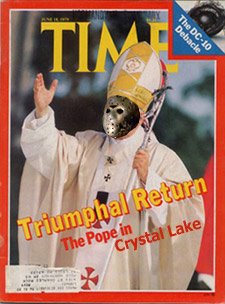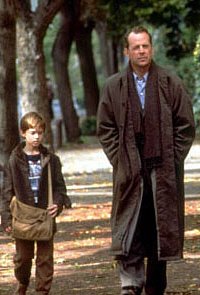Cache (Hidden) (
2006; d. Michael Haneke; s. Daniel Auteil, Juliette Binoche).
As with the horror film, the thriller is the most moral of films.
It’s not a new observation to notice that as much blood- and intestine-shed and depravity as there is in the seminal
Friday the 13th series, ultimately conservative values are rewarded in the rush to restore order.
Similarly with the thriller—while certainly we might spend our quality time and sympathy on the criminal, more often than not, bad gets punished, or it gets away and we have to cope with our own disappointment that things did not go to plan.
But whatever happens, the anarchic effects of the original crime are somehow suppressed and order is restored, whether through conventional means of crime and punishment, or through deceit—the criminal has some crucial bit of information that encourages the hero (or antagonist, if the criminal is the antihero we’ve been tracking for the entire film) to let him or her go in the service of a greater good.
Although not a proper thriller, see for reference
Chinatown, where the crimes are so unspeakable that once blood has been shed, the actual history must be expunged.
Order above all.
 There is so much preamble to the discussion of Cache in part because I ramble, but in part because never have I been so tempted to spoil a movie so I can talk about it effectively. The four or five reviews I read prior to seeing the movie each spoiled the ending of the movie, which also tempts me to continue the cycle of abuse. The ending is not a major twist ala M. Night, but I think knowing what happened structured my viewing and kept my focus elsewhere, so my experience of the film was very different from my friends who were completely confused by the thing. Well, I was confused too, but in a more constructive way, because I had time to brace for the gimmick all the way through (which also buffered me from the emotion of the ending, which I will also not spoil).
There is so much preamble to the discussion of Cache in part because I ramble, but in part because never have I been so tempted to spoil a movie so I can talk about it effectively. The four or five reviews I read prior to seeing the movie each spoiled the ending of the movie, which also tempts me to continue the cycle of abuse. The ending is not a major twist ala M. Night, but I think knowing what happened structured my viewing and kept my focus elsewhere, so my experience of the film was very different from my friends who were completely confused by the thing. Well, I was confused too, but in a more constructive way, because I had time to brace for the gimmick all the way through (which also buffered me from the emotion of the ending, which I will also not spoil).

What I can say—Cache is the story of a well-to-do, intellectual French couple being terrorized by mysterious (and somewhat innocuous) videotapes indicating someone is watching them.
What I will say—there’s a way that Cache is very conventional. It follows nearly every formality of the thriller. Daniel Auteil and Juliette Binoche fracture under the pressure of the tapes. The police ignore them. Auteil (in another great performance—I love this guy) takes the law into his own hands. Order is restored. Sort of. And as with every good thriller, guilt drives the action, mysteries are revealed, and hubris is punished.
 However, Haneke uses the structure of the thriller to subvert and critique those conventions. Ordinarily, we feel relief at the close of a thriller, or at least some sense of closure, because order has been restored. Here, we feel welling despair. Haneke finds a whole new clever way of ripping off Hitchcock and John Carpenter and putting the audience in the antagonist POV. There is no music in the film, and it is shot on digital video almost entirely in flatly constructed wide shots, so you are often unclear whether you are actually watching the surveillance videos or the actual film until the movie starts rewinding abruptly. The film plays elliptically, willfully turning away at points that might be revelatory or emotionally resonant, just as a guilty conscience does.
However, Haneke uses the structure of the thriller to subvert and critique those conventions. Ordinarily, we feel relief at the close of a thriller, or at least some sense of closure, because order has been restored. Here, we feel welling despair. Haneke finds a whole new clever way of ripping off Hitchcock and John Carpenter and putting the audience in the antagonist POV. There is no music in the film, and it is shot on digital video almost entirely in flatly constructed wide shots, so you are often unclear whether you are actually watching the surveillance videos or the actual film until the movie starts rewinding abruptly. The film plays elliptically, willfully turning away at points that might be revelatory or emotionally resonant, just as a guilty conscience does.
Even as it glances around, Cache still manages to touch live wires of race relations in France and the U. S.—the psychological correlations between the white guilt in this movie eerily presage the riots in Paris and the response to Katrina in New Orleans. Our past doesn’t go anywhere. We can deny it, ignore it, even to ourselves, but some crimes have no reparations, and instead we wind up trying to go on like nothing ever happened.
And Haneke doesn’t leave Auteil out there on his own. Guilt, as any good psychologist will tell you, is an emotion based on a construction of how we feel we are perceived by others. As opposed to more "innate" emotions like happiness or sadness, guilt depends on our awareness of an invisible audience.
 Via his direction and his attention to the characters, Haneke makes that psychological construct manifest, turning us into a literal invisible audience watching and judging all the way through as Auteil’s choices become progressively devastating to him and his family (if understandable). Still, as the pressure mounts and we get more clues that Auteil knows the secret of the tapes, we are encouraged to ally with Juliette Binoche, to tell him to confess. In one brief, ambiguous scene late in the film between Juliette Binoche and her son, we get the suggestion that although Juliette Binoche has been prodding her husband throughout the movie to open wider and let her in, she may have some secrets of her own. This scene is also critical because it flips the game on the audience as well. In this scene, the son passes judgment on her (correct or not), and each audience remember is encouraged to reflect on his or her own glass house. Like Closer taught us, it isn’t always the truth that builds healthy relationships; sometimes it’s just what you need to believe to get by.
Via his direction and his attention to the characters, Haneke makes that psychological construct manifest, turning us into a literal invisible audience watching and judging all the way through as Auteil’s choices become progressively devastating to him and his family (if understandable). Still, as the pressure mounts and we get more clues that Auteil knows the secret of the tapes, we are encouraged to ally with Juliette Binoche, to tell him to confess. In one brief, ambiguous scene late in the film between Juliette Binoche and her son, we get the suggestion that although Juliette Binoche has been prodding her husband throughout the movie to open wider and let her in, she may have some secrets of her own. This scene is also critical because it flips the game on the audience as well. In this scene, the son passes judgment on her (correct or not), and each audience remember is encouraged to reflect on his or her own glass house. Like Closer taught us, it isn’t always the truth that builds healthy relationships; sometimes it’s just what you need to believe to get by.
Cache is a perfect elliptical little mystery of a film, in part because it is rooted not only in the relationships between the characters, but also in the audience’s relationship to the film. It’s no mistake that the videotapes themselves are almost innocuous, with little or no threatening material, other than flatly depicting Auteil and Binoche’s life and creating an awareness of some outside observer. Once you know you’re being observed, guilt and self-consciousness seeps in, and things break down. I’m sure the fact I saw race relations and male/female relationships was motivated in part by my own little guilty preoccupations
 but I’m also sure that the movie’s flat spaces leave a lot of room for some other guilty preoccupations to emerge, and for the audience to leave with a little sense that they have been seen, been judged, and somehow found wanting. So even though you get the payoff on this story, order ain’t restored. Order is part of the crime, because it keeps us safe, but keeps us from truly seeing ourselves, and, as they say, learning and growing.
but I’m also sure that the movie’s flat spaces leave a lot of room for some other guilty preoccupations to emerge, and for the audience to leave with a little sense that they have been seen, been judged, and somehow found wanting. So even though you get the payoff on this story, order ain’t restored. Order is part of the crime, because it keeps us safe, but keeps us from truly seeing ourselves, and, as they say, learning and growing.
Which is bad. Because as we all know, knowing is half the battle.
 Next Time: Shadow Conspiracy
Next Time: Shadow Conspiracy

 However, Haneke uses the structure of the thriller to subvert and critique those conventions. Ordinarily, we feel relief at the close of a thriller, or at least some sense of closure, because order has been restored. Here, we feel welling despair. Haneke finds a whole new clever way of ripping off Hitchcock and John Carpenter and putting the audience in the antagonist POV. There is no music in the film, and it is shot on digital video almost entirely in flatly constructed wide shots, so you are often unclear whether you are actually watching the surveillance videos or the actual film until the movie starts rewinding abruptly. The film plays elliptically, willfully turning away at points that might be revelatory or emotionally resonant, just as a guilty conscience does.
However, Haneke uses the structure of the thriller to subvert and critique those conventions. Ordinarily, we feel relief at the close of a thriller, or at least some sense of closure, because order has been restored. Here, we feel welling despair. Haneke finds a whole new clever way of ripping off Hitchcock and John Carpenter and putting the audience in the antagonist POV. There is no music in the film, and it is shot on digital video almost entirely in flatly constructed wide shots, so you are often unclear whether you are actually watching the surveillance videos or the actual film until the movie starts rewinding abruptly. The film plays elliptically, willfully turning away at points that might be revelatory or emotionally resonant, just as a guilty conscience does.  Via his direction and his attention to the characters, Haneke makes that psychological construct manifest, turning us into a literal invisible audience watching and judging all the way through as Auteil’s choices become progressively devastating to him and his family (if understandable). Still, as the pressure mounts and we get more clues that Auteil knows the secret of the tapes, we are encouraged to ally with Juliette Binoche, to tell him to confess. In one brief, ambiguous scene late in the film between Juliette Binoche and her son, we get the suggestion that although Juliette Binoche has been prodding her husband throughout the movie to open wider and let her in, she may have some secrets of her own. This scene is also critical because it flips the game on the audience as well. In this scene, the son passes judgment on her (correct or not), and each audience remember is encouraged to reflect on his or her own glass house. Like Closer taught us, it isn’t always the truth that builds healthy relationships; sometimes it’s just what you need to believe to get by.
Via his direction and his attention to the characters, Haneke makes that psychological construct manifest, turning us into a literal invisible audience watching and judging all the way through as Auteil’s choices become progressively devastating to him and his family (if understandable). Still, as the pressure mounts and we get more clues that Auteil knows the secret of the tapes, we are encouraged to ally with Juliette Binoche, to tell him to confess. In one brief, ambiguous scene late in the film between Juliette Binoche and her son, we get the suggestion that although Juliette Binoche has been prodding her husband throughout the movie to open wider and let her in, she may have some secrets of her own. This scene is also critical because it flips the game on the audience as well. In this scene, the son passes judgment on her (correct or not), and each audience remember is encouraged to reflect on his or her own glass house. Like Closer taught us, it isn’t always the truth that builds healthy relationships; sometimes it’s just what you need to believe to get by. but I’m also sure that the movie’s flat spaces leave a lot of room for some other guilty preoccupations to emerge, and for the audience to leave with a little sense that they have been seen, been judged, and somehow found wanting. So even though you get the payoff on this story, order ain’t restored. Order is part of the crime, because it keeps us safe, but keeps us from truly seeing ourselves, and, as they say, learning and growing.
but I’m also sure that the movie’s flat spaces leave a lot of room for some other guilty preoccupations to emerge, and for the audience to leave with a little sense that they have been seen, been judged, and somehow found wanting. So even though you get the payoff on this story, order ain’t restored. Order is part of the crime, because it keeps us safe, but keeps us from truly seeing ourselves, and, as they say, learning and growing.


0 Comments:
Post a Comment
<< Home